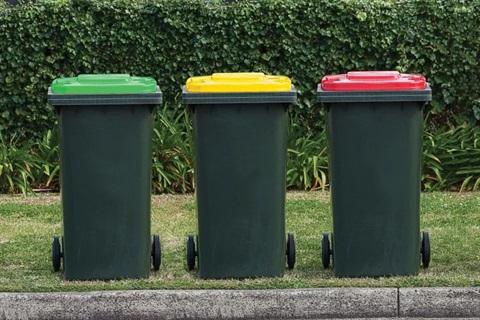
While it is not yet finally resolved, Council made a decision at its Ordinary Council Meeting in February to support in-principle the roll out of a Food Organics Garden Organics (FOGO) kerbside collection service in 2024 and to accept $228K from the NSW Environment Protection Authority (EPA) towards getting prepared.
A final resolution about when to introduce FOGO will only be made mid-year when Council considers tenders for a new kerbside collection service. The current kerbside contract is due for renewal, having already been extended beyond its original end date of 3 November 2022.
FOGO, when adopted, will see an additional green-lidded bin added to the red and yellow wheelie bins. Green bins will be for putrescible waste – food and garden waste – which will be collected and turned into compost for re-use on farms and in gardens.
Mayor Cr Tony Reneker said that Council doesn’t have a choice about the introduction of a green bin for FOGO – as it’s been mandated by the State Governments by 2029/30 – but acting sooner rather than later will reap considerable benefits.
“In June 2021, the NSW Government mandated the implementation of a FOGO collection service for all local councils by 2030 and, if we adopt it early, Council gets to secure the maximum grant funding that is being made available to support the roll-out of this new service. This ultimately means less cost to our ratepayers compared to delaying to a later date,” he said.
Mayor Reneker also highlighted that with tenders for a new kerbside collection service imminent, contract negotiations will be less complicated and arguably more cost effective if they include FOGO from the start as Leeton Shire will have the benefit of aggregating the procurement of the wheelie bins and FOGO kitchen caddies with other RAMJO Councils (Riverina and Murray Joint Organisation of Councils).
“Aligning the new suite of kerbside collection services with a new service contract will lock in better pricing as Leeton will potentially be able to leverage the buying power of eight other neighbouring Councils that are all working together to
try to get the best deal for their residents. If we hold off until 2030, we will lose that opportunity,” he said.
The NSW EPA grant funding will be specifically directed towards developing a community education and promotion program for FOGO. It will also cover two years of roll-out support and waste audits to ensure residents understand and are using the system correctly, so that contamination is minimised and composting success is assured.
There are also other reasons to support a FOGO Service. Speaking as the Portfolio Lead for Environment & Climate Change, Cr George Weston reminded Council that when organic waste ends up in landfill, it releases methane gas into the atmosphere which is approximately 23 times more harmful to the environment than CO2. It also unnecessarily fills up our landfill cells, which are expensive to operate.
“A significant benefit associated with FOGO is the reduction in the amount of waste going to landfill. It is expected that the landfill cell life will increase by an estimated 11.08% per annum which represents an approximate landfill space saving to the value of $31,000 per annum.”
“Also, diverting FOGO from landfill will help us meet some of the other mandates set by the NSW Government, such as the 80% waste diversion targets by 2030 and the CO2 net zero reduction targets by 2050,” he said.
Council’s Manager Environmental Sustainability, Luke Tedesco, said that the introduction of FOGO would mark a significant milestone for Council to work towards a more environmentally friendly and sustainable long-term waste and recycling strategy.
“In coming to an agreement and adopting this recommendation now, Council has secured substantial funding to put towards an education program that will be essential for the successful implementation of a new FOGO service. It is good to be using government money and not ratepayer money to achieve this,” he said.






